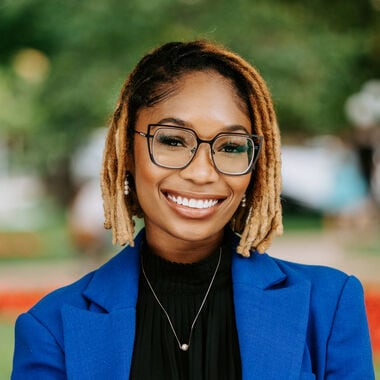I saw the future, I saw a vision, I saw that our students would eventually graduate, and I wanted to make sure that they had financial literacy education that was relevant to them, relevant to their life experiences as well as their racial and gender identities.
My name is Ray’Chel Wilson. I'm an alumna of the Ohio State University's School of Public Health and a current student at Duke Graduate School. I served in the 2019 Greater Tulsa Corps where I taught biology and personal finance at KIPP Tulsa University Prep High School.
I became a certified financial education instructor through my school's professional development fund, created a personal finance curriculum for those students. And that's what turned into my first workbook series. Now I have the honor to be able to serve folks across the country and across the world and building their wealth journeys and overcoming financial traumas, healing through those and being able to receive relatable and easy-to-apply education and information for their wealth journeys.
I serve in the education technology sector as CEO of Raise the Bar Investments where we create financial literacy curriculum and books like the internationally selling of Black Wealth Freedom series, as well as the Money Talks workbook, which I shouted out my TFA experience. I also serve as CEO of For Our Last Names where we empower early career professionals to unlock financial freedom through customized pathways, actionable education and secure financial partnerships. After teaching an investment per personal finance lesson for my students. One of them asked Miss Wilson, “how do I start investing?” They heard about my success investing and paying off my student loans in under two years. And then they saw the lesson and they're like, OK, give me the deets. And I said, you know, before I even tell you what to do, let me tell you why I do it. And I mentioned that, you know, it's not just building wealth for myself. It's not even just building wealth to teach my students. It's so we can build generational wealth and liberate our communities.
Not a lot of people realize that being a teacher is in a sense, being an entrepreneur in your own classroom, in your own economy, being able to be solution-oriented for your key stakeholders, which are your students. That was my experience and being able to not only problem solve in the classroom in a way that applied also in the marketplace but also just being able to build those relationships with my students and understanding that relationship building is a key skill for any industry. I'm so grateful for all of the skills and the resources that I've learned and have been able to transfer into different industries.
Disinvested communities like Black Wall Street, Tulsa, Oklahoma. If you know the history, then you know the history, if not look it up. Our students had a lot of generational trauma. Not only with the systems that were meant to protect them but also trauma within their lifetime. I mean, I was teaching in the middle of the pandemic. So not only were students not able to afford food, but students weren't able to afford masks. We had graduating seniors that weren't able to afford caps and gowns. So I say this to say that it was important not only for my students but also for myself to understand the importance of healing. The importance of becoming one with self, understanding your own values, not only personal values but the values that you bring to any project and environment and space. And I think once one heals, or at least I'll speak for myself, once I healed and once I saw my value and the values that I bring to spaces, I was able to have more teachable moments with my students and relate as human to human, not just teacher to student.
I always say the best place to start in one's career path is service. I talk a lot about this and how to invest in yourself. Well, invest in yourself by first investing in the community. I will say that Teach For America was a great landing spot post-undergrad to be able to understand how my leadership abilities not only could grow in the classroom but also could directly impact future leaders from the classroom.
Ultimately, I learned that the best way to make a difference is by starting with service, by leading with understanding your specific community that you are in at the time, by listening to that community and then starting to serve. Listen, learn and serve.
